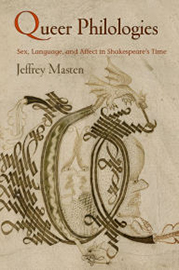The Curious Case of “Q”
Professor Jeffrey Masten’s new book explores the dynamic relationship between sexuality and language
 English professor Jeffrey Masten’s journey started years ago with an epiphany at a scholarly conference on the history of sexuality.
English professor Jeffrey Masten’s journey started years ago with an epiphany at a scholarly conference on the history of sexuality.
It ended this year with the publication of Queer Philologies: Sex, Language, and Affect in Shakespeare’s Time (University of Pennsylvania Press), Masten’s deeply researched, 368-page tome that investigates the intimate, intertwined historical relationship between sexuality and language.
What happened at the conference that ignited your work with Queer Philologies?
I realized that we were all beginning our presentations with pocket etymologies of sexual or gender terms without fully exploring why and how this language work mattered for the history of sex. I began to see my research as “revivifying” languages of sex, the body and emotion that we no longer use, or use differently – but also as focusing on what gets “lost in translation” between the sexual past and present.
How would you define the book’s thesis?
Queer Philologies has two central claims: first, that we can’t do the history of sexuality without analyzing the often very different languages that past cultures used to talk and write about sex; and second, that we need to double back and analyze the normalizing sexual rhetoric the study of language (philology) uses to do its work. What gets erased, for example, in thinking about languages as “families”?
What surprises did you encounter while researching this project?
I was particularly surprised to see a different conception of the alphabet and letters in the European Renaissance. Take the letter Q, which gets a surprising amount of discussion as “aberrant.” It has an unruly “tail” leading either backward or forward that “touches” the “tip” or “bottom” of another letter “from below.” So Q is associated with the rhetoric of sodomy, typically condemned in Renaissance culture. At the same time, Q has a “faithful friend” in the letter U/V, and Q is the only letter that “desires” to connect with one other letter, so there’s also positive, homoerotic male-friendship language around Q – and a queer sort of monogamy, for a letter.
How would you characterize your objectives with Queer Philologies?
I want to continue to help us think about how we do the history of sexuality — and how a more self-conscious analysis of sex’s language illuminates current sexual and gendered terms. Like many of my colleagues in Northwestern’s English department, where we have a very deep bench in Renaissance studies, I’m also trying to help readers see more of the strange richness hiding in plain sight in Shakespeare, Christopher Marlowe and other early modern writers. What does it mean, for instance, when Shakespeare writes, “Now we speak upon our Q”?
In what ways does your book complement the scholarship on sexuality and gender currently taking place at Weinberg?
There’s a lot of great scholarship on gender and sexuality going on in Weinberg, especially through the Gender & Sexuality Studies Program, where I’m affiliated, and SPAN, the Sexualities Project at Northwestern, which largely focuses on contemporary issues through social-science approaches. Queer Philologies illustrates that there’s also gender and sexuality scholarship at Northwestern about the past and in the humanities, while connecting with that other work at an interdisciplinary crossroads of social history, history of the language, queer theory, English literature and even psychology.
Back to top